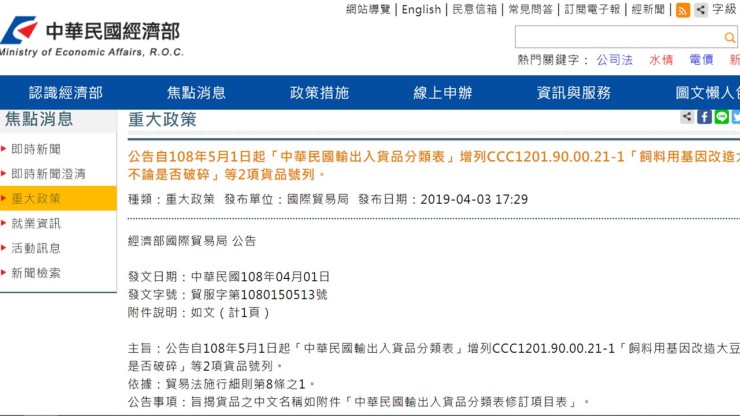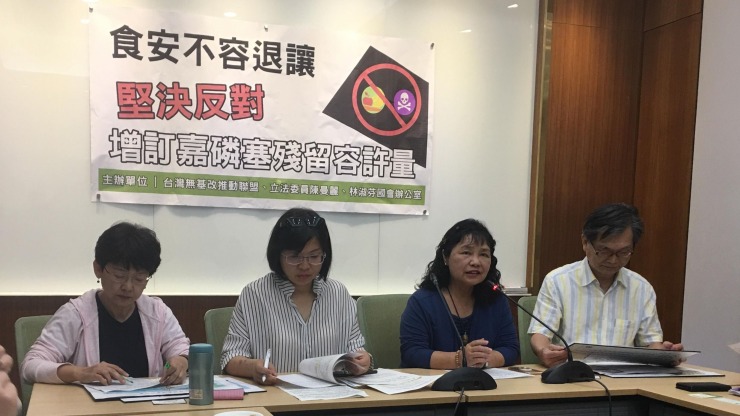Taiwan-Japan exchanges | persistence brings strength: report on Taiwan's non-basic Reform Movement in 2019
2 sharing
Editor's note: the original report is the report of "GMO National Exchange meeting in Japan (cancelled due to epidemic situation)" scheduled to be held in Shiga Prefecture on March 14, 2020, completed on February 25, 2020.
Photo by Chen Ruwei (co-sponsor of campus lunch and member of Taiwan Alliance for the Promotion of non-basic Reform) | 2019 seed Life Festival. Provided by the Taiwan Alliance for the Promotion of non-basic Reform
I am honored to be invited to participate in the national exchange gathering of GMO in Japan this year, but I am really sorry that I will not be able to attend because of the COVID-19 epidemic. Globalization has made the spread of disease beyond national boundaries, and the administration of disease control has become more complex due to political, economic and social considerations. this situation is also truly reflected in our daily diet.
Taiwan is one of the few countries in the world that consume large amounts of GM soybean products in their daily life. the self-sufficiency rate of domestic soybeans is only about 1/1000, and it is often subject to strong pressure from the United States in the process of international trade and policy-making. The "Taiwan Alliance for the Promotion of non-basic Reform," jointly established by several non-governmental organizations, with limited human and material resources, aims to awaken consumers' right to know and jointly face the challenge of food self-sufficiency.
This report aims at "current situation of GM crops and food", "legal norms" and "non-governmental initiatives" to share the results of the actions of Taiwan's non-GM Alliance in 2019.
Current situation of genetically modified crops and Food in Taiwan
At present, Taiwan does not allow the cultivation of any GM crops, and the GM raw materials used in food must be examined before they can be imported. As of February 24, 2020, a total of 150 kinds of GM food ingredients in five categories, including soybeans, corn, cotton, rape and sugar beet, have passed the examination.
In June 2017, Taiwan's Ministry of Health and Welfare announced the list of cases under consideration of GM food raw materials, regularly publishing GM food ingredients waiting for review, including potatoes, papaya and sugar cane. As representatives of non-governmental organizations are unable to participate in the scrutiny and discussion, we have been asking the Government to disclose detailed minutes of meetings in recent years, so that consumers can take the initiative to express their views in response to their worries.
Add the import number list of "feed modified and non-modified soybeans"
In October 2014, at the request of Taiwan's non-GM Promotion Alliance and public opinion representatives, the Ministry of Economic Affairs for the first time added the classification numbers of GM and non-GM maize, corn kernels, soybeans, soybean flour, and so on. only in this way can we trace the sources of supply of GM and non-GM products and track their flow; in May 2019, the Ministry of Economic Affairs added two new item numbers, such as "GM soybeans for feed" and "non-GM soybeans for feed".
According to customs statistics, Taiwan imported a total of 85532 metric tons of non-GM soybeans and 2589283 metric tons of GM soybeans in 2019, of which 2135 metric tons of "GM soybeans for feed" were imported from the United States. As for "non-modified soybeans for feed", the import volume is zero.


Source: Bureau of Foreign Trade, Ministry of Economic Affairs
The standard of residual allowance of Jiaposu plug was successfully added by the Ministry of Weifu.
In April 2019, the Ministry of Health and Welfare of Taiwan originally set a standard for glyphosate residues in miscellaneous grain crops such as barley, oats, rye, millet, quinoa, buckwheat and sorghum, which was proposed to be adjusted from ND to 10ppm.
After this news was disclosed by the media, the Taiwan Alliance for the Promotion of non-basic Reform and other non-governmental organizations jointly launched an opposition action, successfully bringing together consumers' attention to this policy through strategies such as calling for co-signature, holding press conferences, and matching media submissions. In August of the same year, Taiwan's Ministry of Health and Welfare announced that it would suspend its implementation and maintain the current residue standard of 21 crops.
In February this year, Taiwan's Supervisory Yuan proposed a case to rectify this amendment, saying that the Ministry of Health and Welfare, as the administrative authority, ignored food hygiene and safety and the risk of cancer caused by captopril, and failed to do its duty to protect people's health.

- Prev

Guanshan Town Farmers 'Association 18 th Farmers' Day Conference County Government Affirmation Farmers 'Association Marketing
The Farmers 'Association of Guanshan Town, Taitung County held a celebration of Farmers' Day at the American School yesterday (18) to praise outstanding farmers. Liu Minqian, the confidential secretary of the county government, who attended on behalf of Rao Qingling, wished the farmers and thanked them, and especially encouraged them to return home.
- Next

Wuhan pneumonia 0319 "the whole country scrambled for materials, but leafy vegetables could not be sold, and the land price was only 40% last year. Farmers called for eating more vegetables.
Wuhan pneumonia 0319 "the whole country scrambled for materials, but leafy vegetables could not be sold, and the land price was only 40% last year. Farmers called for eating more vegetables.
Related
- A course of planting techniques and methods on how to grow carrots
- How to plant the latest tulips?
- Is it better to pick tea in the morning or in the afternoon? When is the best time for tea to be picked? what is the third or fifth tea?
- Launch Yuanxiao Happy combination Haocha + Tea Yuan healthy Taste
- Penghu Tourism "Fireworks 20 Parade with You"
- 2022 West Lake Happiness holds "Digital Revitalization Voucher" and draws iphone13 and laptop.
- Banqiao Fuzhou social houses are designed to change start-up combined with police elimination to create a safe and livable environment
- The convenient measure of "mechanical weeding" in Xinbei has been abused and the Agriculture Bureau has imposed heavy penalties on the illegal land consolidation.
- Changgeng University Joins Hands with Four Memory Factories to Rescue Memory Talent Shortage
- The list of Taiwan's top 100 MVP managers is listed by the Director-General of the Farmers' Association of Sanxia District.

